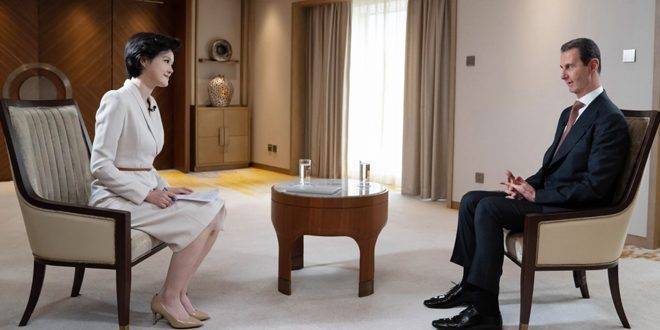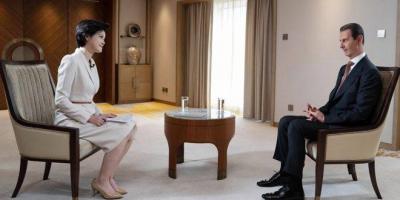Syrian President Bashar al-Assad stated that China is a major power playing a very important role globally, and that when it discusses partnership, it refers to a new principle rather than domination. In an interview with China Central Television (CCTV), he noted that China has politically supported Syria through its role in the UN Security Council and various international forums. He emphasized the natural need for broader dialogue with China in light of the current global circumstances and the harsh western economic blockade aimed at starving the Syrian people. Assad affirmed that the Syrian people are capable of rebuilding their country once the war ends and the blockade is lifted.
He continued: "There must be joint projects and interactions between Chinese and Syrian expertise in industrial economic projects, firstly because China's conditions a few decades ago were similar to many third world countries, and secondly, because social and value concepts, which play a fundamental role in the development process, cannot be separated from social conditions. Therefore, we can benefit from the Chinese experience in many aspects, perhaps we cannot benefit in the same way from many western countries. We and many countries in our region have tried to benefit from Western experiences but have failed; in fact, the results of imitation have had negative outcomes for those countries."
Regarding the war in Syria, he said: "No, the war is not over; we are still in the heart of it. However, I want to say that Syria, as a geographical location throughout ancient history, has always been a passageway for invasions. Whenever an occupier came, it destroyed cities, which is Syria's history. However, it has always been rebuilt. Certainly, the Syrian people are capable of rebuilding their country when the war and blockade end. The problem lies in the social effects that may arise; when you lose something material, you can rebuild it, but when you lose something intellectual or cultural, it goes and does not return. Now our region faces two types of dangers with this war: the danger of modern western liberalism and the danger of extremism. Thus, societies are faced with two bad things that appear to be different but are actually one and the same. What we are focusing on now is maintaining values and belonging because values and belonging help us build our society or homeland. When we lose these values, everyone will migrate, and there will be no one willing to defend their country or perform any act that serves society; that is the challenge."
He added: "We are losing oil and wheat in areas outside our sovereignty. We were a country that exported wheat; now we have only a little wheat left. We have no electricity; how can there be life without electricity? Of course, we have far less than the minimum for life, but that is not enough." He noted that suffering is increasing, and the Syrian people, who have always lived in normal relations with different countries, can exchange trade, culture, and knowledge, all of which are vital. "This interaction is essential for the country to remain prosperous; it is under increasing suffocation from western countries," he stated. "However, this does not mean we cannot do anything, and this is one of the focal points of this visit. Support from friendly nations is vital and essential, not necessarily through aid; aid can be for humanitarian reasons, but I mean to open doors so that the Syrian people, who have old capabilities, can rebuild their country, interact, develop, and prosper. We possess these capabilities; we do not lack them. This type of economic, political, and cultural relationship can open doors for us to start anew."
He continued: "Of course, we are now facing an internal challenge related to the war and blockade but also an external challenge related to the global economic situation, the effects of COVID-19, and the impacts of the war in Ukraine, all of which have led to rising prices, in addition to increased interest on the dollar, thereby increasing difficulties for all countries. The essential prescription for such a situation is the transition, not just for Syria, but for all countries, to shift from dealing in dollars to other currencies, primarily the yuan."
On the Saudi reconciliation, he said: "As for the Saudi-Iranian reconciliation, it was a significant and unexpected accomplishment, but it was a very nice surprise because this problem has existed for four decades in our region or slightly more." He added: "This initiative was more than just a reconciliation between two parties. It was not simply about two people who were enemies becoming friends; no, it is a matter of stability. This aspect will have a positive reflection on all of us in the Middle East because we have been paying the price for this issue for several decades, and today we feel reassured regarding this point.
On the other hand, when China announced this reconciliation, it meant that politics relies on work rather than words, speeches, and empty Western propaganda; there was genuine political work."




